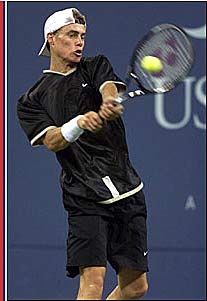<% ns_puts [mkm_getnavbar] %>
Pete Sampras: No Memories of Little Lleyton
I guess I shouldn't have been as hard on Kafelnikov. The display that Lleyton Hewitt put on today was masterful. He is without a doubt the mentally toughest player on the men's tour today. That may seem obvious but in the past rarely have the absolute top players come out on top psychologically in my annual Psycho-rankings. For a guy of Hewitt's size and game, what he accomplished at the Open is astonishing, a feat that was overwhelmingly psychologically driven.
To play at an intensity level Lleyton does you have to be extremely
motivated. It takes enormous determination to carry out a game plan that
relies on speed and total concentration. In the era of the big game  Hewitt
cannot afford to slack off for an instant. Just think what would have
happened against Roddick if Hewitt had for a second lost his focus in the
deciding set, he would have been gone. That's what made his victories
against Kafelnikov and Sampras even more amazing. In contrast to most of
his matches that are close and hard fought, he blew two players away who
should have been able to overpower and dominate him.
Hewitt
cannot afford to slack off for an instant. Just think what would have
happened against Roddick if Hewitt had for a second lost his focus in the
deciding set, he would have been gone. That's what made his victories
against Kafelnikov and Sampras even more amazing. In contrast to most of
his matches that are close and hard fought, he blew two players away who
should have been able to overpower and dominate him.
Michael Chang must be looking on and shaking his head, wondering whether it's those 2 inches Hewitt has on him or something else. The "Michael Chang" of the new millennium as Hewitt has been called is a bit faster, has a slightly longer reach and serves much better than Chang. The serve is what really separates him from Chang, with Hewitt now being able to win many a free point off it. Psychologically, Hewitt mirrors Michael's earlier mental characteristics.
|
Hewitt is also a testament to preparation. He is one of those rare professionals who does not take his tennis for granted, working harder than most players on his physical and technical game, something smaller players have to do. His work has paid off and has given him enormous self-confidence to compete with and beat the biggest players and hitters in the game.
As far as Sampras is concerned, from a psychoanalytic perspective we again come back to those emotional memories. Up until now Pete has been able to summon strength and mobilize his best game when encountering players he has had major significant encounters with. Against Rafter, Agassi, and Safin we saw Sampras play the kind of game we are used to seeing. In those matches his best neural templates containing the technique, tactics, thoughts and emotions he experienced against these players boost his motivation to the level he needs to win big matches.
On the other hand, his emotional memories regarding Hewitt are yet not as strong. After all, last year he beat Hewitt in the semis, a guy many players have underestimated, whereas he was out for revenge against Agassi, Rafter, and especially Safin who he lost to in last year's final. Consequently, he was not as "up" for his match today, his psychological energy had essentially been depleted.
Nevertheless, he probably thought he still would have the firepower to beat Hewitt. I don't want to sound old and redundant but I must continue to drive the point home that players and coaches need to become more aware of the psychodynamics that drive players and their matches. Guarding against psychological letdowns by using psychophysiological assessment methods and intervention protocols to manipulate mental energy must become part of the modern player's preparation routine, especially since there is <% ns_puts [nsv_get mkm_includes mkm_oldContentFooter_inc] %>

